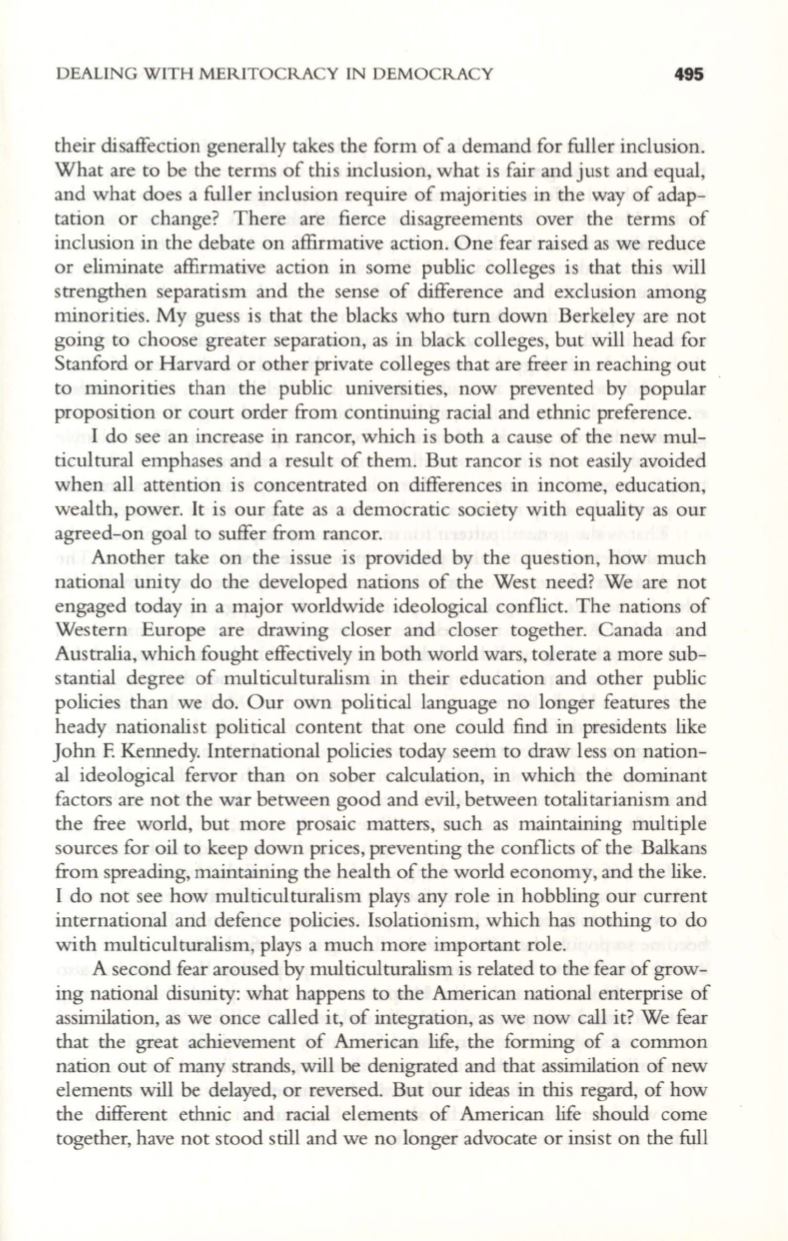
DEALING WITH MERITOCRACY IN DEMOCRACY
495
their disaffection generally takes the form of a demand for fuller inclusion.
What are to be the terms of this inclusion, what is fair and just and equal,
and what does a fuller inclusion require of majorities in the way of adap–
tation or change? There are fierce disagreements over the terms of
inclusion in the debate on affirmative action. One fear raised as we reduce
or eliminate affirmative action in some public colleges is that this will
strengthen separatism and the sense of difference and exclusion among
minorities. My guess is that the blacks who turn down Berkeley are not
going to choose greater separation, as in black colleges, but will head for
Stanford or Harvard or other private colleges that are freer in reaching out
to minorities than the public universities, now prevented by popular
proposition or court order from continuing racial and ethnic preference.
I do see an increase in rancor, which is both a cause of the new mul–
ticultural emphases and a result of them. But rancor is not easily avoided
when all attention is concentrated on differences in income, education,
wealth, power.
It
is our fate as a democratic society with equality as our
agreed-on goal to suffer from rancor.
Another take on the issue is provided by the question, how much
national unity do the developed nations of the West need? We are not
engaged today in a major worldwide ideological conflict. The nations of
Western Europe are drawing closer and closer together. Canada and
Australia, which fought effectively in both world wars, tolerate a more sub–
stantial degree of multiculturalism in their education and other public
policies than we do. Our own poli tical language no longer features the
heady nationalist political content that one could find in presidents like
John
F.
Kennedy. International policies today seem to draw less on nation–
al ideological fervor than on sober calculation, in which the dominant
factors are not the war between good and evil, between totalitarianism and
the free world, but more prosaic matters, such as maintaining multiple
sources for oil to keep down prices, preventing the conflicts of the Balkans
from spreading, maintaining the heal th of the world economy, and the like.
I do not see how multiculturalism plays any role in hobbling our current
international and defence policies. Isolationism, which has nothing to do
with multiculturalism, plays a much more important role.
A second fear aroused by multiculturalism is related to the fear of grow–
ing national disunity: what happens to the American national enterprise of
assimilation, as we once called it, of integration, as we now call it? We fear
that the great achievement of American life, the forming of a common
nation out of many strands, will be denigrated and that assimilation of new
elements will be delayed, or reversed. But our ideas in this regard, of how
the different ethnic and racial elements of American life should come
together, have not stood still and we no longer advocate or insist on the full


